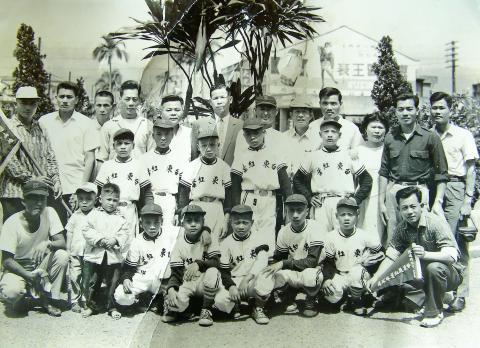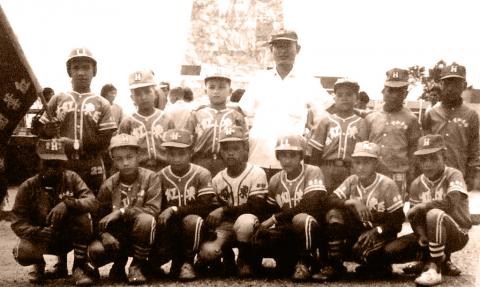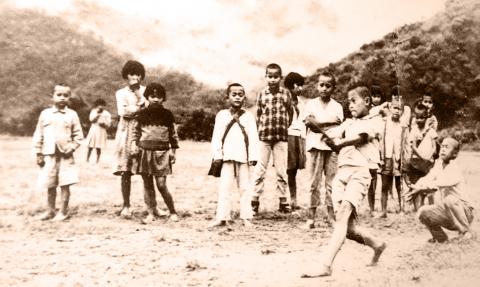Aug. 21 to Aug. 27
Chiu Sheng-teh (邱聖德) recalls protesting in anger when he heard a sports commentator say that the accomplishments in the 1960s of the Hongye Junior Baseball Team (紅葉少棒), made up of members from the Bunan Aboriginal people, were just an exaggerated legend that was sensationalized by the media and should not be celebrated.
Chiu’s father was a member of the 1968 team, which pretty much ignited Taiwan’s baseball craze, serving as a prelude to the glorious 1970s when Taiwanese teams dominated the international circuit.

Photo: Yang I-min, Taipei Times
But despite the team’s inspirational rags-to-success story, it seemed to always have its skeptics — and its fair share of controversy. In response, Chiu later published the study The Summer of 1968: A Study on Hongye’s Life History (1968年的夏天 - 紅葉少棒隊生命史的研究).
BASEBALL LEGEND
Let’s look at the legend first. It almost didn’t happen for the Hongye little league baseball team. Despite claiming first place at the Chiumao Cup (秋茂杯) in Tainan in March 1968, the team announced that it would not be able to make it to the National Youth Tournament in Taipei the following month because it lacked funding.

Photo: Chang Chun-wei, Taipei Times
Situated in an impoverished Aboriginal village in Taitung County, it is said that the team would often have to practice with “sticks as bats and stones as balls.” According to a news report from May 1968, the school only had 114 students and five staff, including the principal. Luckily, Hongye’s plight was widely reported in the media, and the donations poured in, enabling the team to participate. It eventually captured the championship by defeating a team from Chiayi 2-1.
The story does not stop here, as Hongye’s success earned it a match with a visiting Japanese all-star team. Up to this point, no Taiwanese youth team had defeated a youth team from Japan. On Aug. 25, however, after seven innings, Hongye emerged the winner with a 7-0 finish, and reportedly did not even allow a Japanese player past first base. Victory was sealed when Hongye scored two home runs in a row in the sixth inning. News reports show that bills of NT$10, NT$50 and NT$100 rained down from the crowd of 20,000 despite attempts by officials to stop the behavior.
Two days later, then-defense minister Chiang Ching-kuo (蔣經國) personally congratulated the team and promised that he would visit their village. In addition, the Ministry of Education announced that it would give the school NT$10,000 for sports equipment. The era of Taiwanese dominance of the diamond had just begun, which was a boost for the nation at a time when it was losing its international standing.

Photo: Wang Ing-ming, Taipei Times
Why would such a beautiful story have so many doubters?
THE DOUBTERS
First of all, there was the scandal that the team used older players from outside the school who competed under false names. As early as June 18, 1968, the United Daily News ran an article stating that 23 fans had reported the behavior to the Ministry of Education and the National Baseball Association.
Hongye denied the claims, and the association concluded that there was not enough evidence, and allowed the team to continue competing, adding that it had “strict” screening methods. Hongye principle Hu Hsueh-li (胡學禮) stated in a news conference that the accusations were made by jealous opponents.
Not much news was made of it over the following months, but on April 26,1969, coach Hu and the team’s manager were convicted and sentenced by the Taitung District Court for forgery of public documents. The United Daily News report said that they had falsified the ages of five players and also used players from outside the school who played under the names of several current players.
The final bit of controversy is that for whatever reason, the popular version of events became that Hongye beat the Japanese little league world champion Wakayama on that day. This version is perpetuated even to recent times, as the school celebrated the 40th anniversary of its victory against “Wakayama” in 2008.
Chiang Chieh-long (江杰龍) shows in the study The Rise of the Hongye Little League Baseball Team (台東紅葉少棒隊的崛起) that there was mass confusion in the media as to whom exactly Hongye would be playing, with each article stating something different or being ambiguous. In the end, the Wakayama version stuck.
Chiang’s argument, however, is that it could not have been the Wakayama team because they were competing in the Little League World Series in the US, which didn’t conclude until Aug. 24. The question is, was this confusion intentional to boost the team’s legend, or was it just sloppy reporting?

April 14 to April 20 In March 1947, Sising Katadrepan urged the government to drop the “high mountain people” (高山族) designation for Indigenous Taiwanese and refer to them as “Taiwan people” (台灣族). He considered the term derogatory, arguing that it made them sound like animals. The Taiwan Provincial Government agreed to stop using the term, stating that Indigenous Taiwanese suffered all sorts of discrimination and oppression under the Japanese and were forced to live in the mountains as outsiders to society. Now, under the new regime, they would be seen as equals, thus they should be henceforth

Last week, the the National Immigration Agency (NIA) told the legislature that more than 10,000 naturalized Taiwanese citizens from the People’s Republic of China (PRC) risked having their citizenship revoked if they failed to provide proof that they had renounced their Chinese household registration within the next three months. Renunciation is required under the Act Governing Relations Between the People of the Taiwan Area and the Mainland Area (臺灣地區與大陸地區人民關係條例), as amended in 2004, though it was only a legal requirement after 2000. Prior to that, it had been only an administrative requirement since the Nationality Act (國籍法) was established in

With over 80 works on display, this is Louise Bourgeois’ first solo show in Taiwan. Visitors are invited to traverse her world of love and hate, vengeance and acceptance, trauma and reconciliation. Dominating the entrance, the nine-foot-tall Crouching Spider (2003) greets visitors. The creature looms behind the glass facade, symbolic protector and gatekeeper to the intimate journey ahead. Bourgeois, best known for her giant spider sculptures, is one of the most influential artist of the twentieth century. Blending vulnerability and defiance through themes of sexuality, trauma and identity, her work reshaped the landscape of contemporary art with fearless honesty. “People are influenced by

Three big changes have transformed the landscape of Taiwan’s local patronage factions: Increasing Democratic Progressive Party (DPP) involvement, rising new factions and the Chinese Nationalist Party’s (KMT) significantly weakened control. GREEN FACTIONS It is said that “south of the Zhuoshui River (濁水溪), there is no blue-green divide,” meaning that from Yunlin County south there is no difference between KMT and DPP politicians. This is not always true, but there is more than a grain of truth to it. Traditionally, DPP factions are viewed as national entities, with their primary function to secure plum positions in the party and government. This is not unusual